<< Previous | Displaying results 91-100 of 128 for "Nazi Book Burning" | Next >>
American novelist Ernest Hemingway on safari, ca. 1933. In 1933, Nazi students at more than 30 German universities pillaged libraries in search of books they considered to be "un-German." Among the literary and political writings they threw into the flames were the works of Ernest Hemingway.
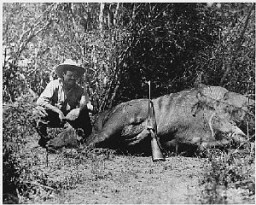
Author Ernest Hemingway aboard the boat Pilar, ca. 1950. In 1933, Nazi students at more than 30 German universities pillaged libraries in search of books they considered to be "un-German." Among the literary and political writings they threw into the flames were the works of Ernest Hemingway.
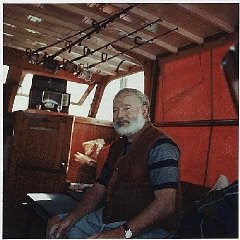
A newspaper clipping with the headline "Against the Un-German Spirit" announces the plundering of the Institute for Sexual Science. The photo shows students marching to the institute's entrance before the looting began on May 6, 1933. The institute's books and documents were among those targeted during the Nazi book burnings.
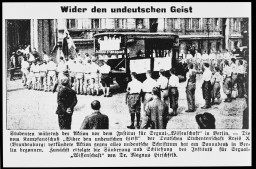
Portrait of Helen Keller, seated, reading Braille. September 1907. In 1933, Nazi students at more than 30 German universities pillaged libraries in search of books they considered to be "un-German." Among the literary and political writings they threw into the flames during the book burning were the works of Helen Keller.
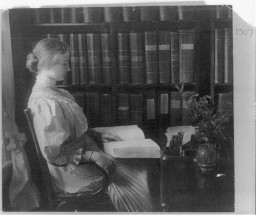
Portrait of writer Sigrid Undset, who won the Nobel Prize for Literature in 1928. Often with feminist themes, her novels were banned and burned in part because of her public criticism of the Nazi regime. Photo taken by Anders Beer Wilse on July 1, 1923.
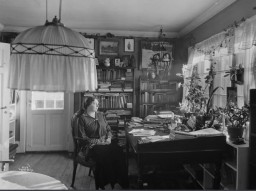
Vladimir Lenin was the leader of a faction of Russian communists known as the Bolsheviks. After the Russian Revolution broke out in 1917, Lenin seized control and established the Soviet Union. Photographed circa 1920. The Nazis had declared themselves the sworn enemies of Bolshevik Russia, its architect and dictator Vladimir Lenin, and his successor Josef Stalin.
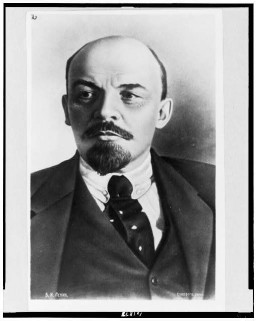
Bertolt Brecht, author of the "Threepenny Opera" and a well-known leftist poet and dramatist, who emigrated from Germany in 1933. In exile, he co-edited an anti-Nazi magazine titled Das Wort. London, Great Britain, 1936.
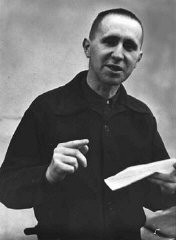
Bertolt Brecht (left), Marxist poet and dramatist, was a staunch opponent of the Nazis. He fled Germany shortly after Hitler's rise to power. Pictured here with his son, Stefan. Germany, 1931.
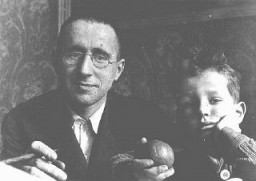
Seward Daily Gateway (Alaska) article from April 14, 1933, titled "Great Bonfires of Forbidden Books in Germany to Blaze." This article from Berlin, written the month before the book burnings took place, reported that "Great bonfires will be burning on the campus of German universities in a few days, when the latest Nazi decree goes into effect. The Hitler regime is continuing its nationalistic crusade, has ordered that all books which deal with non-German subjects or espouse non-German causes, must be…
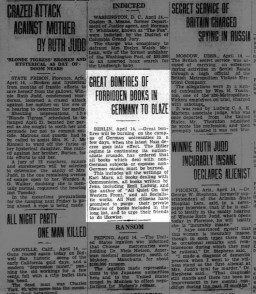
The American Jewish Congress was among the first groups in the United States to oppose Nazism. It held a mass rally as early as March 1933, soon after Hitler rose to power in Germany, and continued to hold rallies throughout the war years. The American Jewish Congress organized this anti-Nazi march through Lower Manhattan. The event coincided with book burning in Germany.
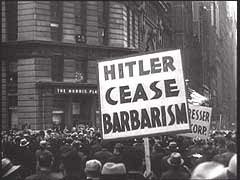
We would like to thank Crown Family Philanthropies, Abe and Ida Cooper Foundation, the Claims Conference, EVZ, and BMF for supporting the ongoing work to create content and resources for the Holocaust Encyclopedia. View the list of donor acknowledgement.